China-Malaysia International Anti-cancer Seminar
On March 7, 2019, the delegation of Malaysian Anti-Cancer Association, Malaysia-China Medical Group, The National University of Malaysia and major media and known cancer experts paid a visit to St. Stamford Modern Cancer Hospital Guangzhou, aiming at better understanding Chinese anti-cancer technology development during these years and deeply discussing minimally invasive technology on cancer treatment, as well as strengthen the coordination and development on medical industries between China and Malaysia. Mr. Lin Shaohua, Director of Operations at St. Stamford Modern Cancer Hospital Guangzhou, put out the welcome mat for the delegation.
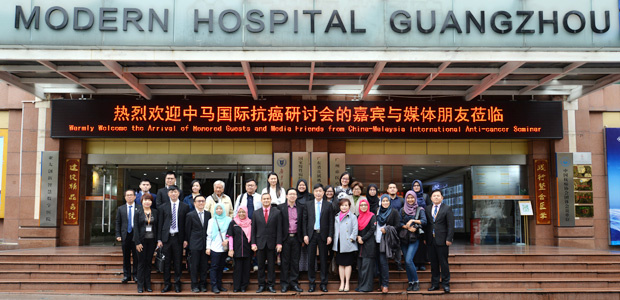
Leadership of the hospital and the Malaysian delegation
The Malaysian delegation and the leadership of St. Stamford Modern Cancer Hospital Guangzhou held a meet-and-greet conference at International Conference Center at the ninth floor of the hospital building. At the beginning of the conference, Mr. Lin Shaohua gave a brief introduction of the hospital and its recent development, he noted, “We are pleased to have you here to communicate directly and discuss the idea of minimally invasive treatment. I believe it would strengthen our friendship and lay a solid foundation for our future medical cooperation. And I sincerely hope that through this exchange we can have a further cooperation and learn from each other to push China-Malaysian medical health care to a high level, to share our technology and benefit more cancer patients.”
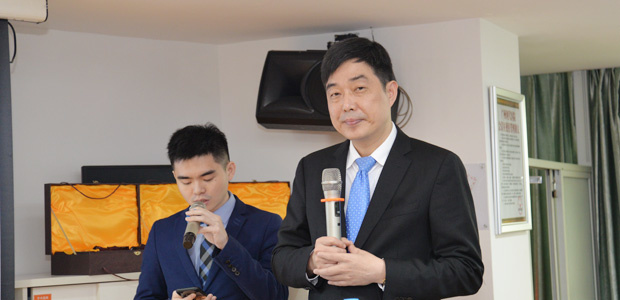
Mr. Lin Shaohua is giving his welcoming speech
The Malaysian delegation expressed its appreciation and congratulation on the development and achievements of St. Stamford Modern Cancer Hospital Guangzhou in recent years, especially the role it played in the medical cooperation between China and Malaysia. MELISSA TAN JUATLI responded, “In recent years, more and more Malaysian cancer patients come to China for minimally invasive treatments, and the number keeps rising. Your hospital St. Stamford Modern Cancer Hospital Guangzhou has become their first option. Though Malaysia has not yet introduced minimally invasive technology, but this is not the reason we stopped learning. I hope that through this exchange, Malaysian patients can get better follow-up treatment and recovery after returning home.I hope that this exchange will not only deepen the relationship between the doctors of the two countries, but also enable the two countries to further deepen cooperation in the medical field.”
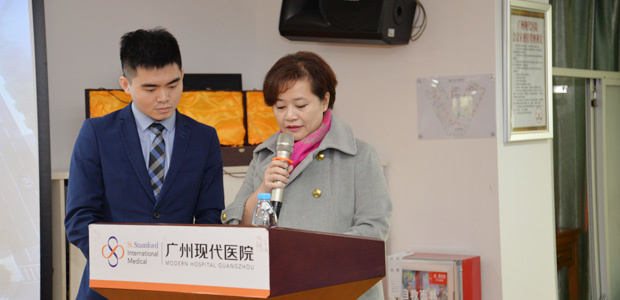
Sharing from MELISSA TAN JUATLI, principal of Malaysia-China Medical Group
To deepen the medical and cultural communication, experts and doctors from two countries respectively shared their ideas and experience. To have a better knowledge of minimally invasive therapy, a live interventional therapy for a stage IV breast cancer patient by Director Zhen Yanli and a live particle implantation for an ovarian cancer patient by Director Dai Wenyan were arranged for the delegation. In addition, Director Dai Wenyan and Director Huang Deliang respectively gave a presentation on Newest Treatment on Breast Cancer and 3D printing template assisted seed implantation to better explain what is minimally invasive therapy and how it works.
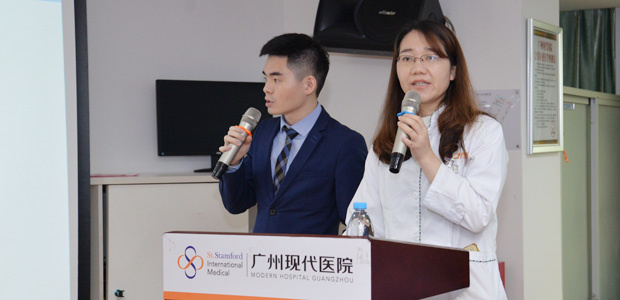
Director Dai Wenyan share on Newest Treatment on Breast Cancer
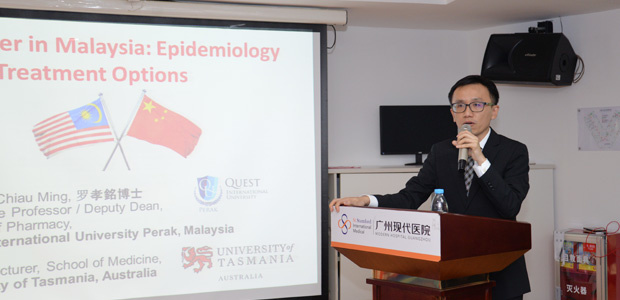
Dr. Long Chiau Ming from the National University of Malaysia is giving his presentation on Cancer in Malaysia
On the afternoon, Dr. Long Chiau Ming from the National University of Malaysia later gave his presentation on Cancer in Malaysia: Epidemiology and Treatment Options, and Dr. Aman Shah Bin Abdul Majid introduced Botanical Drug Development for Cancer Therapy in Malaysia. Besides, Dr. Rozilawati Ahma, focusing on the physiological treatment for cancer patients, shared her new non-published Outshine, a Cancer Survivor Photo Gallery which depicts the pain and joy of cancer warriors and it aims to expose the deeper fragility of humanity from which unbelievable strength arises. All of these sharing left a deep impression on the on-site medical staff.
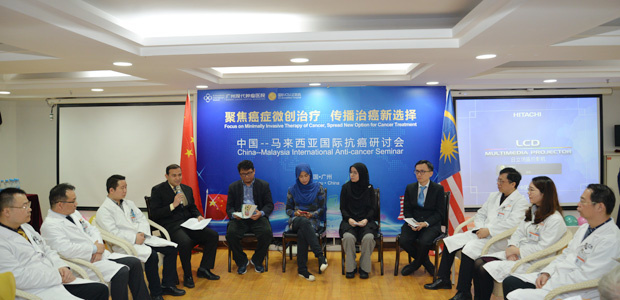
Exchanges between Multidisciplinary Team(MDT) and medical experts from the delegation
On the next day, Multidisciplinary Team (MDT) grouped by Director Dai Wenyan, Prof. Zhang Hua and Director Wu Qingkai and other oncologists and Malaysian delegation extended a intensive discussion on “How to better coordinate when facing the challenge of cancer treatment gap?”. The doctors have a heated discussion on the issues they put forward and reached an agreement on necessary communication to reduce or remove misunderstandings and they will work together to create a beneficial environment for cancer patients and cancer treatment.
The delegation visited some of the hospitalized cancer patient to know their condition. LING CHEE CHONG, a nasopharyngeal cancer patient from Malaysia told them, “ Minimally invasive therapy here is advanced, after my first session of treatment, I felt obviously improved, and there was no side effects such as nausea, vomiting, and hair loss. I hope that these advanced anti-cancer technologies can be spread to Malaysia, so that more Malaysian cancer patients can get better treatment.”
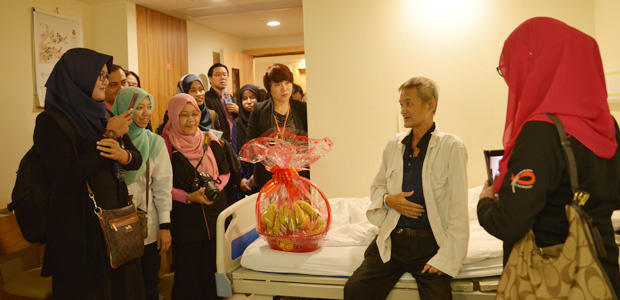
Visiting LING CHEE CHONG, a nasopharyngeal cancer patient from Malaysia
“This trip has been very meaningful, far beyond our expectations, thank you for invitation, we therefore have a better knowledge of minimally invasive treatment and we learned a lot. We will try best to explore more filed for future coordination and develop more in-depth and extensive communication, so that more cancer patients in Malaysia can get the best treatment.” agreed by all the members of the delegation.
*Surgery, in addition to the appropriate chemotherapy and radiotherapy, are effective in treating early cancer, but certain patients in late stage of cancer may not be tolerate surgery well as they can be relatively weak. A combination of carefully planned minimally invasive therapy, chemotherapy or radiotherapy can effectively reduce the side effects and discomfort of treatment and may help patient get better efficacy.













 viber
viber